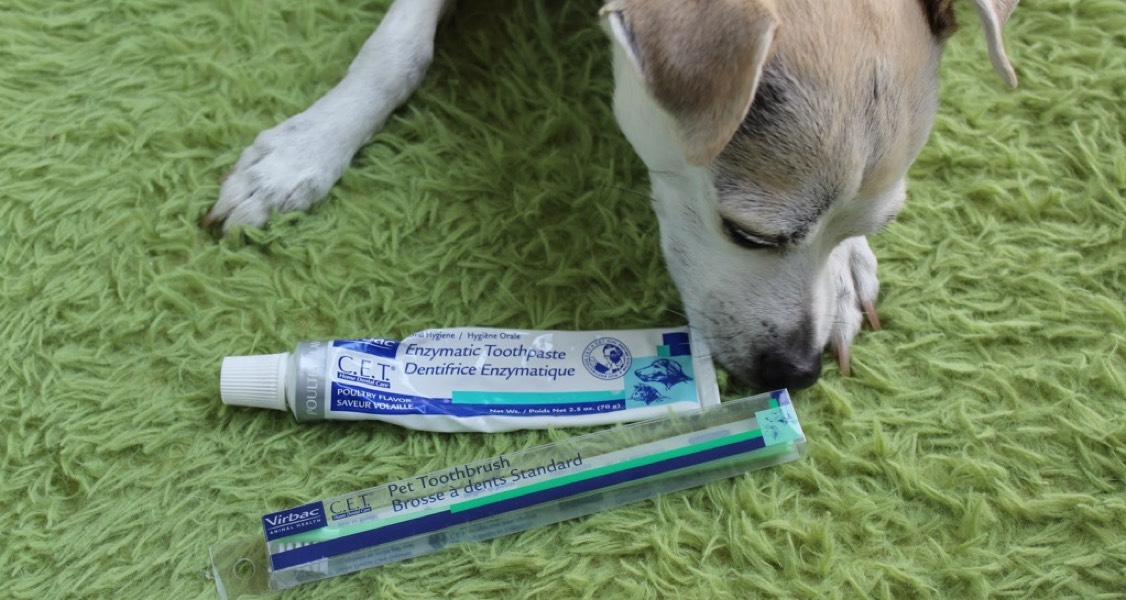Pet Dental Care Products 101: Decoding Product Claims
By: Ian Nicholson | Aug 12, 2022

Shopping for pet dental care formulas can feel a little challenging. You want safe and effective items, but you run into terms like “natural,” “human-grade,” and “organic” as you read their labels. How do you evaluate such statements? Are organic, human-grade, or natural formulas better than their conventional counterparts? Can pet dental care products be organic at all? Without some guidance, it’s easy to feel overwhelmed. Keep reading for tips on understanding these and other claims on dental care formulas.
How Does “Natural” Apply to Pet Toothpaste?
Consumers have become more conscious about their health and the environment. In response, companies are creating formulas touted to be natural. Pet food, treats, and dental care items are no exception.
Government oversight on the subject is spotty at best. The United States Food and Drug Administration mentions its informal policy: “Natural” should describe foods without artificial or synthetic contents added. Canada regulates how producers of human food use the term through the Canadian Food Inspection Agency. Neither country mandates specific requirements for its use on pet dental care items.
What Do “Human-Grade” and “Food-Grade” Mean?
You may notice the terms “food-grade” or “human-grade” on pet food, treats, and even dental care labels. They typically suggest items or contents that are fit for humans to eat. Neither United States nor Canadian law specifies how companies may use these terms in their labeling and marketing.
As the Association of American Feed Control Officials points out, truth in advertising is the core issue. Pet products labeled as human-grade should meet human standards of edibility. If a dental care formula for pets purports to have human-grade content, the original ingredients would also need to be human edible.
How Can Pet Toothpaste Be Organic?
You may come across dental care items for pets claiming to be organic or have organic ingredients. The term “organic” usually refers to plant or animal foods produced without pesticides, growth hormones, antibiotics, or chemical fertilizers.
Both the United States and Canada govern this term’s usage in human food labeling and marketing. Companies who want to display a USDA Certified Organic label on their items must apply with an accredited third-party certifying body and undergo an inspection. To be certified organic in Canada, human food and animal feed must have at least 95% or more organic content.
Pet dental care products can carry the USDA Certified Organic label if they contain agricultural ingredients and meet the other certification standards. While the Safe Food for Canadians Regulations do not specifically apply to dog or cat dental products, companies can mention certified organic plant- or animal-based ingredients on their labels.
Are organic dental care items better for your pet? In 2017, several researchers reviewed the impacts of organic food on human health based on available literature. Their report, published in Environmental Health, concluded that organic food production could help humans due to reduced pesticide exposure and the less frequent use of antibiotics. It’s currently unclear whether our pets could experience similar advantages.
What Are Botanicals?
Some pet dental care formula labels claim to have botanical ingredients. The United States National Institutes of Health describes a botanical as a “plant or plant part valued for its medicinal or therapeutic properties, flavor, and/or scent.” A 2017 report revealed that Canada doesn’t precisely define the term but allows traditional, homeopathic, and herbal remedies to be sold as Natural Health Products. NHPs are intended for human consumption, but Canadian law doesn’t regulate labeling, marketing, or usage of botanicals in pet products.
Botanicals can include fruits, vegetables, herbs, and plant parts such as leaves, stalks, roots, or seeds. Pet dental care products on the market may incorporate several varieties:
- Coconut oil
- Green tea leaf extract
- Cinnamon
- Clove oil
- Olive leaf extract
- Thyme essential oil
- Papaya leaf extract
Manufacturers may add botanicals to their formulas and make claims about their therapeutic benefits. While early studies could lend some credence to these claims, more evidence is needed to substantiate them.
Pet dental care products may include plant-based ingredients for other reasons. Sweet potato can add fiber, texture, and flavor. Some varieties have parsley or fennel seed oils to add flavor and freshen breath.
What’s the Bottom Line?
You want the best for your furry family member, so you look for find high-quality dental care products It’s easy to take claims like “natural” and “human-grade” at face value, but it’s wise to do some detective work. Can pet dental care products be organic? Certainly, if they meet the appropriate standards. Ultimately, any item you buy must ultimately deliver safe and effective cleaning power.
Series Articles
- Pet Dental Care Products 101: What Pet Parents Should Know
- Pet Dental Care Products 101: Active Ingredients
- Pet Dental Care Products 101: Avoid These Ingredients
- Pet Dental Care Products 101: Flavors, Thickeners, and Preservatives


Disclaimer: healthcareforpets.com and its team of veterinarians and clinicians do not endorse any products, services, or recommended advice. All advice presented by our veterinarians, clinicians, tools, resources, etc is not meant to replace a regular physical exam and consultation with your primary veterinarian or other clinicians. We always encourage you to seek medical advice from your regular veterinarian.

